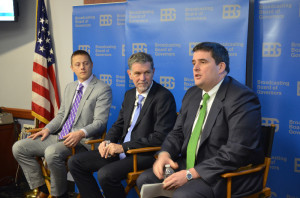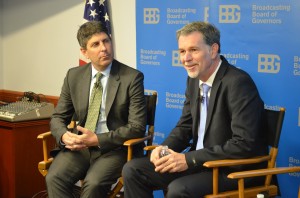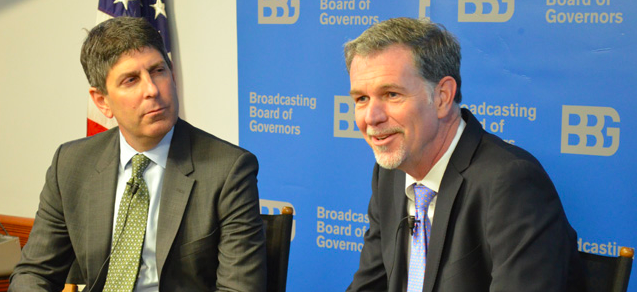BBG Watch Commentary
Broadcasting Board of Governors (BBG) Chairman Jeff Shell should be applauded for arranging a visit to the federal agency by Netflix CEO Reed Hastings and his participation in a panel discussion on technology and innovation. The event was held Wednesday, December 18, at the Broadcasting Board of Governors (BBG) headquarters in Washington, DC.

Reed Hastings made a refreshingly unassuming, honest and informative presentation. Fortunately, the discussion went beyond the topic of technology, thanks to both Hastings and Shell, but also thanks to the two other panel participants: Macon Philips, Coordinator of the State Department’s Bureau of International Information Programs, and Tom Cochran, Chief Technology Officer at Atlantic Media.
Hastings, Philips, and Cochran described how companies, media outlets, and government agencies can best develop a strategy for adjusting to technological and societal changes.
All panelists focused on leadership, taking and managing risk, and the value of having motivated and engaged employees.
Starting with Hastings, all participants also stressed at various points that as important as technology and new media are, organizations cannot lose sight of their ultimate mission purpose and the content designed to serve that mission. Reed Hastings acknowledged that the BBG is a public institution with a unique public mandate and programs to serve specific international audiences. Macon Philips made the same point about the State Department and its communications and public diplomacy mission. He also worked at the White House on media and U.S. domestic public outreach issues before moving to the State Department.
We are pleased not only that this discussion took place but also that it moved beyond issues of technology. Some of the former and even current International Broadcasting Bureau (IBB) executives think that new technological solutions, which they alone can control, are the entire answer to how an organization — in this case a public institution with Congressionally-defined different missions for the Voice of America (VOA), Radio and TV Marti, and independent surrogate media outlets such as Radio Free Asia (RFA) — should adjust to technological change and plan for the future.
The discussion showed that organizational change is a far more complex process. Besides technology, there are at least four other key components:
1. Mission, as defined in the case of the BBG by legislation;
2. Leadership;
3. Program content relevant to the mission and the audience (Program content and audience also determined for the BBG to a large degree by legislation, as is the mission.);
4. Employee engagement.
Neglect these four components and downplay Congressional mandates, as some IBB and VOA executives have done for years, and no amount of new technology will prevent an organization from becoming dysfunctional and losing political support at home and credibility and effectiveness abroad. Shut down internal debate and threaten employees with retaliation for criticism of the management, and the organization will quickly become defunct.
The most important message from the panel for us was the need for thoughtful and inspiring leaders who know how to promote and manage change with full engagement from the workforce. Shell, Hastings, Philips, and Cochran have shown that they are such leaders in their respective fields and organizations.
IBB’s Robert Bole, whose promotion to a three-person new interim management team at IBB was just announced, did an excellent job moderating the discussion, although he tended to focus more on technology — his area of expertise — and less on larger, strategic issues. Still, it was a welcome change in terms of demeanor and intellectual honesty compared to public appearances of other IBB officials.
The BBG is now looking for a permanent CEO to lead the agency, which has both federal entities — the highly bureaucratically bloated IBB, the Voice of America, and the Office of Cuba Broadcasting (OCB – Radio and TV Marti) — as well as non-federal, independent media entities: Radio Free Europe / Radio Liberty (RFE/RL), Radio Free Asia, and the Middle East Broadcasting Networks (MBN – Radio Sawa and Alhurra TV).
The Broadcasting Board Governors is the independent federal agency responsible for all U.S. Government and government-sponsored, non-military, international broadcasting. At the BBG meeting Wednesday, which preceeded the panel discussion, BBG Chairman Jeff Shell announced further personnel and management changes at the IBB designed to promote change and innovation with increased employee engagement. Under the former leadership, the agency ranked near the bottom of federal agencies in good management and employee morale.
The panel featuring Netflix CEO Reed Hastings was a welcome change in how BBG members communicate with employees and the American public. They are trying to introduce management reforms in an organization, which — despite embracing new technologies — has become in the last 15 years largely “defunct” in carrying out its mission, as noted by former Secretary of State Hillary Clinton, herself a former BBG member, and others.
Mr. Hastings was both humble and impressive as a visionary leader. That’s the kind of new leaders that the agency needs after more than a decade of stagnation under the entrenched IBB bureaucracy, which managed to survive and both ignore and manipulate former part-time BBG boards. They were thus able to make mistakes for the last fifteen or so years, but without being forced by anyone to correct them, until very recently. BBG Watch takes some credit for exposing the management crisis at IBB and VOA, and earlier at RFE/RL.
Some reforms were already implemented, especially at RFE/RL under new CEO Kevin Klose, but much more remains to be done, especially at IBB and VOA.
Let’s hope that Jeff Shell and the new BBG Board will be able to turn things around quickly and with good results for the agency’s mission.
###
BBG PRESS RELEASE
Industry Leaders Discuss Driving Media Innovation

WASHINGTON, DC – Measuring impact, supporting experimentation, defining a clear vision and motivating staff to drive change were topics highlighted in a technology panel hosted by the Broadcasting Board of Governors and featuring Netflix CEO Reed Hastings.
“The story of Netflix has many parallels to our challenges here,” said BBG Chair Jeff Shell in introducing Hastings. “It started out as a physical DVD-by-mail company, and now, Netflix is one of, if not the largest, streaming media company in the world. The parallels to the challenges of this agency as we transform, makes Netflix a great company to try to learn from.”
The discussion with industry leaders was part of the BBG’s fresh approach to help the agency navigate media’s evolving landscape and build audience engagement.
Hastings noted, “Having a clear vision of your long-term goal helps move an organization forward.”
He also provided examples of rapidly evolving overseas technology, saying, “When you look at the rate of smart phone adoption, it’s pretty easy to see that Internet connectivity via phone devices is going to be almost ubiquitous.”
After an opening conversation with Shell, Hastings was joined by Macon Philips, Coordinator of the State Department’s Bureau of International Information Programs, and Tom Cochran, Chief Technology Officer at Atlantic Media, for a panel discussion on managing international media organizations in the digital age. The panel, moderated by the BBG’s Director of Innovation, Robert Bole, covered a variety of topics from recruiting talent to utilizing engagement data.
When asked about how to attract and keep talent, Cochran, who prior to joining Atlantic Media served as Director of New Media Technologies for the White House, explained that the key is selling the mission. “Engineers want to solve big problems,” he said. “We have to sell them [engineers] on the mission of media. We have to sell them on the fact that they can help change the world, the way news and information is consumed, and that’s important.”
Passion for an organization’s mission, and the freedom to take risks, the panel concluded, will also drive internal innovators to collaborate and try to solve complex problems and overcome obstacles.
“One of the advantages of being in business rather than government is that mistakes are encouraged,” Hastings added. “In business, we say fail a lot, fail fast, and figure it out… our fundamental mantra for employees is ‘Freedom and Responsibility’. Our employees can do almost anything, but we educate them on responsibility.”
Macon Phillips, who was instrumental in the development and implementation of the “We the People” online petition platform as the then Director of Digital Strategy at the White House, argued that media and technology are not just tools for informing people. Instead, media should be thought of as means of engaging audiences and giving them a stake in the endeavor. Thanks to digital, audiences are “more powerful. They have access to more information and they can organize themselves. They don’t need governments and businesses as much.” Rethinking strategy for engagement, therefore, is crucial, he concluded.
Understanding your audience is also a key to adapting successfully, the panelists agreed. “Without quantitative data, you can’t tell if you are succeeding,” Cochran explained. Using engagement metrics to understand not only who you are reaching, but how they are interacting with your content is especially important.
The panel discussion was streamed line online and is available for viewing at bbg.gov.
